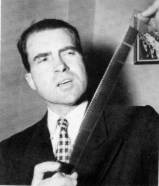History
The Hiss case has maintained a persistent, restless, troubling presence in modern American history, straddling past and present as a piece of stubbornly unfinished business. Some people who are old enough still remember the case, with its swirling charges of treason, lies, and Soviet espionage, as a watershed event in post-World War II America that, because it directly and immediately gave rise to McCarthyism, dramatically changed the course of thousands of American lives and the ways in which additional millions of Americans thought about the world. Other people these days are not quite sure if they have ever heard of Alger Hiss. For still others – some of them Hiss supporters; some of them detractors – the Hiss case has not yet receded into history, and, decades after the end of the Cold War, remains a still-living, unresolved, and now 21st-century event that continues to arouse intense interest, stir passionate debate, and exert its influence on national policy.

Richard Nixon examines a Pumpkin Papers filmstrip for the press.
As a historical subject, the Hiss case is a fast-receding, mid-20th-century federal criminal case – a perjury indictment known officially as The United States of America v. Alger Hiss – that made front-page headlines year after year in the late 1940s and early 1950s. Newspapers of the time routinely called it “the trial of the century.” Richard M. Nixon, then an unknown, first-term congressman from California, became nationally famous for his pursuit of Alger Hiss, and 20 years later, in 1968, was elected president. Because of the Hiss case, Ronald Reagan turned his back on New Deal liberalism, embraced conservative views, and, after entering politics, became president in 1980. Under his presidency, Whittaker Chambers, Alger Hiss’s accuser, was officially given heroic status: Chambers was posthumously awarded the Presidential Medal of Freedom and his Maryland farm (where he had once concealed the “Pumpkin Papers” films) was made a National Historic Landmark.
The details of the case, from Chambers’s first public accusation before the House Un-American Activities Committee (HUAC) in August 1948 to Hiss’s conviction in January 1950, are discussed in the first part of this section of the website. Later parts of this same section present Hiss’s lifelong effort to clear his name, and give an update on what’s happened since his death in 1996 – since the process of vindication outlived Hiss and remains ongoing.

